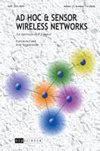Social Mix-zones: Anonymizing Personal Information on Contact Tracing Data
IF 0.6
4区 计算机科学
Q4 COMPUTER SCIENCE, INFORMATION SYSTEMS
引用次数: 4
Abstract
In many different contexts, the encounter between two or more individuals opens a window in which information can be exchanged. Considering Mobile Ad hoc Networks (MANETs) scenarios, encounters - also called contacts - are used to transfer data between nodes (the users). In more recent cases, tracing contacts between individuals has shown to be a strong strategy in mapping the transmission of contagious diseases, such as COVID-19. However, sharing contact data can impose threats to the safety of participants regarding their social and mobility behavior. As an example, we can infer acquaintances, as well as home and work locations. This work presents a strategy to anonymize contact tracing data by utilizing mix-zones, a well-defined concept to anonymize data in a given region. Called social mix-zones, it considers the number of contacts happening in a location, producing anonymized data and protecting the personal integrity of the individuals. We validate the proposal using two real contact tracing data, showing that social mix-zones can cover a large portion of contacts, reducing the risk of malicious location attacks.社交混合区域:匿名化联系人追踪数据中的个人信息
在许多不同的情况下,两个或两个以上的人之间的相遇打开了一扇可以交换信息的窗口。考虑到移动自组织网络(manet)场景,接触(也称为接触)用于在节点(用户)之间传输数据。在最近的病例中,追踪个体之间的接触已被证明是绘制COVID-19等传染病传播地图的有力策略。然而,共享联系人数据可能会对参与者的社交和移动行为的安全构成威胁。例如,我们可以推断出熟人,以及家庭和工作地点。这项工作提出了一种策略,利用混合区域匿名化接触追踪数据,混合区域是一个定义良好的概念,用于匿名化给定区域的数据。它被称为社交混合区,考虑在一个地点发生的接触数量,产生匿名数据并保护个人的个人完整性。我们使用两个真实的联系人跟踪数据验证了该建议,表明社交混合区域可以覆盖大部分联系人,从而降低恶意位置攻击的风险。
本文章由计算机程序翻译,如有差异,请以英文原文为准。
求助全文
约1分钟内获得全文
求助全文
来源期刊

Ad Hoc & Sensor Wireless Networks
工程技术-电信学
CiteScore
2.00
自引率
44.40%
发文量
0
审稿时长
8 months
期刊介绍:
Ad Hoc & Sensor Wireless Networks seeks to provide an opportunity for researchers from computer science, engineering and mathematical backgrounds to disseminate and exchange knowledge in the rapidly emerging field of ad hoc and sensor wireless networks. It will comprehensively cover physical, data-link, network and transport layers, as well as application, security, simulation and power management issues in sensor, local area, satellite, vehicular, personal, and mobile ad hoc networks.
 求助内容:
求助内容: 应助结果提醒方式:
应助结果提醒方式:


